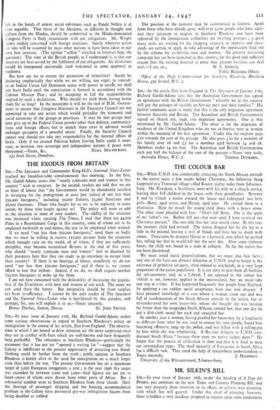THE EXODUS FROM BRITAIN
SIR,—The Spectator and Commander King-Hall's .National News-Letter reached my breakfast-table simultaneously this morning. In the first, Mr. Goold-Adams states that " nearly t,000,000 men and women in this country " wish to emigrate. In the second, readers are told that we are so short of labour that " the Government would be abundantly justified in arranging for the immigration at once [my italics] of not less than zso,000 foreigners," including 50,000 Italians, 25,000 Austrians and 50,000 Germans. Those who fought for us are to be replaced, to some extent, by those who fought against us! The policy will seem as odd as the situation to some of your readers. The oddity of the situation was increased when, opening The Times, I read that there are 44,000 Poles in a Resettlement Corps in this country, some of whom are to be employed forthwith in coal-mines, the rest to be employed when trained.
If we need "not less than 250,000 foreigners," need them so badly that we must be willing to receive 125,000 persons from the countries which brought ruin on the world, all of whom, if they are sufficiently sheeplike, may become naturalised Britons at the end of five years, why should " nearly r,000,000 men and women " feel so daunted by their prospects here that they are ready to go anywhere to escape from their country? If there is no shortage of labour, manifestly we do not need "not less than 250,000 foreigners," and if there is, we cannot afford to lose that million. Indeed, if we do, we shall require another 750,000 foreigners to make up for them.
I am not here concerned with the desirability of increasing the popula- tion of the Dominions with men and women of our stock. The more we can send there the better. But emigration should be from surplus, not from insufficiency. I cannot be the only reader of The Spectator and the National News-Letter who is bewildered by this paradox, and perhaps, Sir, you will explain it to us.—Yours sincerely,


































 Previous page
Previous page